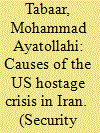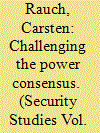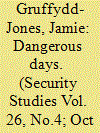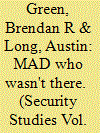|
|
|
Sort Order |
|
|
|
Items / Page
|
|
|
|
|
|
|
| Srl | Item |
| 1 |
ID:
155060


|
|
|
|
|
| Summary/Abstract |
This article provides a revisionist account of the occupation of the US embassy in Tehran in November 1979, one of the most conspicuous manifestations of anti-Americanism in recent history. Drawing solely upon primary documents, largely from various Iranian communists and Islamists, it questions the conventional wisdom that the Islamists' takeover of the embassy was a grassroots reaction to American policies, particularly after President Carter admitted the ailing Shah. It also challenges the argument that the radical students stormed the embassy primarily to bring down the nationalist provisional government. Instead, I introduce a critical overlooked factor and argue that the Hostage Crisis can be better explained as a preemptive act by the Islamists to outbid the leftists' anti-American activities. I demonstrate that the United States and the Islamists were seeking to maintain normal relations during and even after the 1979 revolution. However, various communist organizations that surfaced after the revolution posed an existential threat to the new Islamist-nationalist government, quickly dominating universities, labor unions, and intellectual circles throughout the country and accusing the Islamists and their nationalist allies of collaborating with the United States. In this climate, the Islamists strategically adopted the Left's anti-imperialist language and eventually occupied the US embassy to establish their anti-American credibility.
|
|
|
|
|
|
|
|
|
|
|
|
|
|
|
|
| 2 |
ID:
155059


|
|
|
|
|
| Summary/Abstract |
Power Transition Theory (PTT) has hitherto often relied on power indicators like Gross Domestic Product (GDP) or the Composite Index of National Capability (CINC) to capture its power variable. The underlying assumption is that these indicators are highly correlated, and thus it matters little as to which one the researcher chooses. I call this PTT's power consensus and argue that this consensus is problematic, as the choice of power indicator is often crucial. For PTT, it does not only matter whether such indicators come to similar results by and large; the position of certain singular actors—such as the dominant power, its prime challengers, and the top ranked great powers generally—is even more essential. However, it is precisely with regard to the positions of these actors that we find important discrepancies between what PTT's favored indicators (GDP and CINC) suggest. Analysis of some crucial historical and recent cases supports my challenge to the power consensus. First, the celebrated peaceful power transition between the United Kingdom and the United States in the nineteenth century becomes suspect under closer scrutiny, as GDP places the United States entering the parity zone at a time during which it must arguably be counted as a dissatisfied power. Second, a number of CINC-exclusive power transitions in the twentieth century are not accounted for by GDP. A few possible options might mitigate the power-problem for the cases under scrutiny, however scholars of PTT should generally be much more conscious about their choice of power indicator.
|
|
|
|
|
|
|
|
|
|
|
|
|
|
|
|
| 3 |
ID:
155057


|
|
|
|
|
| Summary/Abstract |
Why do states facing high levels of international threat sometimes have militaries that are heavily involved in government and at other times relatively apolitical, professional militaries? I argue that the answer to this puzzle lies in a state's history of acute international crises rather than its chronic threat environment. Poor outcomes—defeats or stalemates—in major international crises lead to professionalization and depoliticization of militaries in both the short- and long-term. A poor outcome creates pressure for military professionalization and withdrawal from politics in order to increase military effectiveness. This effect persists years later due to generational shifts. As officers of the “crisis generation” become generals, they bring with them a preference for professionalization and guide the military towards abstention from politics. I test this theory using a new global dataset on military officers in national governing bodies from 1964–2008 and find strong support for it.
|
|
|
|
|
|
|
|
|
|
|
|
|
|
|
|
| 4 |
ID:
155061


|
|
|
|
|
| Summary/Abstract |
Does an upsurge in nationalism make interstate conflict more likely? This article gives evidence to suggest that spikes in nationalism do have a direct impact on the likelihood of disputes between states. In it, I use national days or anniversaries as occasions that increase the salience of a national identity and its historical wars. I show that in the two months following national days, conflict is markedly higher than would be expected—almost 30 percent more likely than the rest of the year—and particularly likely for states who initiate conflict or who have revisionist intentions. I demonstrate further how nationalist sentiment can increase international tensions with a case study of national anniversaries in China and Japan. Together, this evidence suggests that the increase in nationalism around national days provides both risks and opportunities to regimes and shapes when they choose conflict over cooperation in international relations.
|
|
|
|
|
|
|
|
|
|
|
|
|
|
|
|
| 5 |
ID:
155058


|
|
|
|
|
| Summary/Abstract |
What do nuclear weapons mean for the stability of the military balance? Mutually assured destruction (MAD) describes a stalemated balance of power where nuclear adversaries possess survivable retaliatory capabilities that ensure neither side can escape devastation in an all-out nuclear war. Moreover, the strong form of this empirical claim, which one might term “deep MAD,” is that mutual vulnerability is an inalterable and unchangeable condition. Drawing from recently declassified primary sources, we test several of deep MAD's premises and predictions on one of its foundational cases: Soviet nuclear policy during the second half of the Cold War. We find that Soviet leaders remained seriously concerned about the nuclear balance even in an allegedly deep-MAD environment where warheads numbered in the tens of thousands. Indeed, Soviet leaders were uncertain that they could indefinitely maintain a secure second strike despite strenuous efforts. The reason for these discrepancies, we argue, is that the nuclear balance is actually more malleable than commonly admitted. The possibility that MAD might one day be escaped meant that US attempts to manipulate the nuclear balance during the latter part of the Cold War could carry political weight, even while MAD was still possible.
|
|
|
|
|
|
|
|
|
|
|
|
|
|
|
|
| 6 |
ID:
155055


|
|
|
|
|
| Summary/Abstract |
Why do some leaders use preventive military force to destroy another country's nuclear program, while others do not? Despite nuclear proliferation becoming a growing source of concern, counter-proliferation decision making remains poorly understood. Additionally, though the preventive logic pervades the scholarship as one potential state response to relative decline, it remains unclear when this leads to war and when it does not, especially in the nuclear context. This article demonstrates that the decision to consider and use preventive force rests not only on material factors but more importantly on a leader's prior beliefs about nuclear proliferation and the threat posed by a specific adversary. Conducting original archival research and process tracing, this manuscript examines American decision making against the Communist Chinese nuclear program, and demonstrates that Presidents John F. Kennedy and Lyndon B. Johnson held fundamentally different nuclear beliefs that led to radically different preventive war preferences.
|
|
|
|
|
|
|
|
|
|
|
|
|
|
|
|
|
|
|
|
|